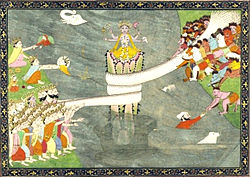Vasuki
Vasuki is a Sanskrit name for a naga, one of the serpents of Buddhist and Hindu mythology. He is a great King of the nagas and has a gem (Nagamani) on his head. Manasa, another naga is his sister. Vasuki is known in Chinese and Japanese mythology as being one of the "eight Great Naga Kings" (八大龍王 Hachi Ryuu-ou), amongst Nanda (Nagaraja), Upananda, Sagara (Shakara), Takshaka, Balavan, Anavatapta and Utpala.
Vasuki was also the name of the devout wife of the Tamil poet Thiruvalluvar.
Legends of Vasuki

The most famous legend in Hinduism that Vasuki takes part in the incident of Samudra manthan, the churning the ocean of milk. He agreed to allow the devas (gods) and the asuras (demons) use him as the churning rope, bound with Mount Mandar when they churned the ocean of milk for the ambrosia of immortality. While Vasuki was being used as a rope, the strain caused him to exhale Halahala, the most potent venom in the universe. There was the danger that the Halahala could destroy all living beings and perhaps the universe itself. Then Shiva, in order to prevent the destruction of the cosmos, decided to swallow the poison himself. The venom turned his throat blue, and thus earned him the title Nilakanta (blue-throated).
Vasuki is also mentioned and used as a tightening rope in other Hindu scriptures, such as in each of the Itihasas (Ramayana and Mahabharata).
In the Bhagavad-Gita (Ch.10, Verse 28), in the middle of the battlefied "Kurukshetra", Krishna explaining his omnipresence, says - "Of seperants(sarpa), I am Vasuki" indicating the importance of Vasuki.
In Buddhist mythology, Vasuki and the other Naga Kings were amongst the audiences of many of the Buddha's sermons. Their duties as Naga Kings included leading the protection, worship and honoring of the Buddha (amongst the Naga) and also to see that other enlightened beings are protected when in danger.
See also
References
- Dictionary of Hindu Lore and Legend (ISBN 0-500-51088-1) by Anna L. Dallapiccola
- Indian Mythology, by ApamNapat
- Nagas
- Stories from the Ramayana
- Hachi Bushu - The Eight Legions, Buddhist Protectors
- Dragon in China and Japan (ISBN 0-7661-5839-X) by M.W. De Visser

